Behind The Scenes: A Look Inside OneNeck's Brand-New Data Center

A Desire For Data
OneNeck IT Solutions has laid down 11.5 million pounds of concrete in Englewood, Colo., as it gets ready to open its first data center. The Scottsdale, Ariz.-based company -- No. 81 on the 2015 CRN Solution Provider 500 -- on June 23 unveiled a $20 million, 35,000-square-foot data center to support the continued boom in data storage and managed online services in the Denver area.
The data center will make it easier for the company to support customers of Englewood-based MSN Communications, which it acquired in October 2013. CRN received a sneak peak of the facility, and spoke with Hank Koch, OneNeck's vice president of mission-critical facilities, to learn more.
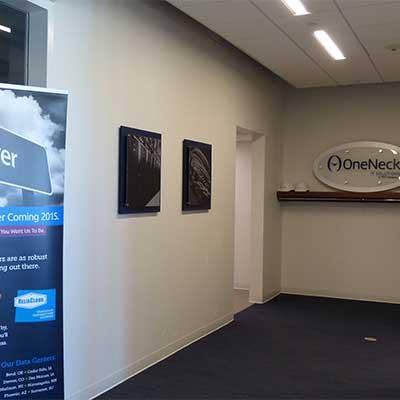
So Close You Can Touch It
OneNeck prides itself on having a local presence so that customers can reach out and touch their IT assets without having to take a one- or two-hour flight, Koch said. In addition to the former MSN customers and OneNeck customers of more than two decades, roughly 100 of OneNeck's 630 employees are based in the Denver area.
"Denver was a very logical and important place for us to create a presence," Koch said.
The facility was constructed on an 11.2-acre lot and can support a build-out of up to 160,000 square feet as demand for off-site data center or cloud services continues to grow, he said.
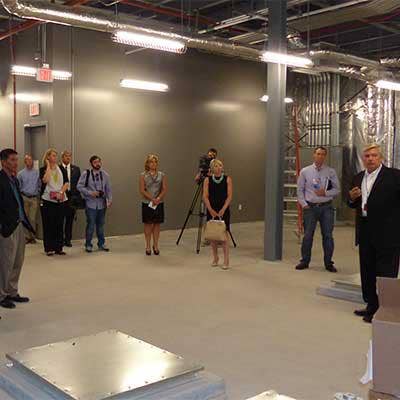
Fulfilling A Coverage Gap
OneNeck has four data centers in the Upper Midwest and two others in the Southwest, with the solution provider focusing the majority of its time and resources in those regions.
Denver serves as a valuable bridge between those two regions, and itself ranks as the eighth most attractive place in the U.S. for data center expansion, with demand vastly outpacing supply, according to OneNeck.
The data center offers easy access to Interstate 470 and is located close to the Denver Technology Center, providing an ideal location and climate for business, Koch said.
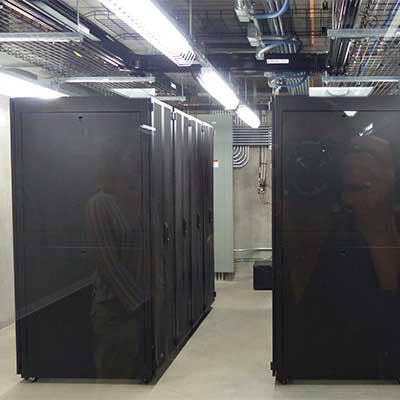
From Selling To Housing Equipment
The data center will allow OneNeck to extend its relationship with the region's customers from simply selling hardware to providing an off-premise home for it.
"When a customer buys equipment, they don't have to look somewhere else to place the equipment if they don't have their own data center," Koch said.
Customers also can place their own equipment in OneNeck's data center, Koch said, with the solution provider looking after and managing operations. The data center also can host cloud services for businesses looking to migrate some workloads to the cloud, he said.
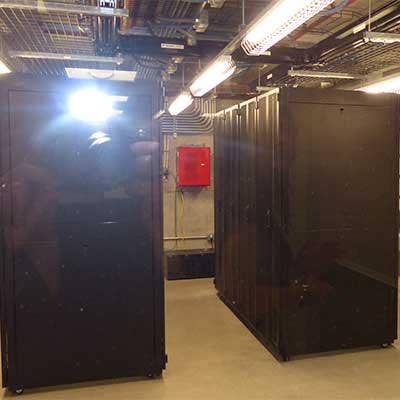
An Eye For Security
OneNeck has gone to extraordinary lengths to protect client data, Koch said.
The data center offers three-factor security authentication, which includes iris dynamics scanners for positive human interaction.
The walls and ceilings of every room are made of 15-inch-think pre-stressed, steel-reinforced concrete, which is designed to be fault-tolerant and continuously maintainable without interruption. The data center also has a very early smoke detection apparatus.
"These are truly fortresses in terms of preserving the assets of our clients," Koch said.
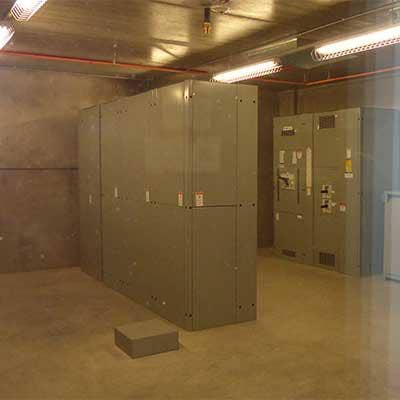
Two Data Rooms Better Than One
Although most early stage data centers offer only a single data room, OneNeck's Colorado facility has two, which Koch said allows for better performance and security.
Having two data rooms cuts the traffic of other tenants in half, Koch said, since far fewer uninvolved parties are walking through the data room.
Having multiple data rooms also allows customers to boost their risk avoidance by straddling, Koch said, preserving their development equipment in a totally separate space. The setup also minimizes risk by allowing OneNeck to straddle if a single customer is having a problem with smoke or power supply, he said.
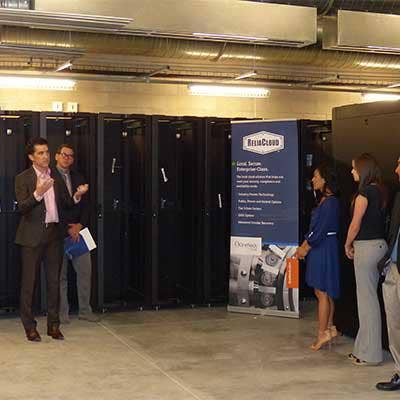
Soar Into The Cloud
The Colorado data center also includes a pod for cloud-based hosting solution ReliaCloud. ReliaCloud is designed for resource-intensive applications and databases that require a secure and compliant operational framework without large capital expenses.
OneNeck is well-equipped to offer its clients full hybrid cloud capabilities, Koch said, allowing businesses to place specialized IT equipment in the physical data center, which is connected to the cloud next door with a single fiber-optic cable.
The data center also serves as an entry point for new customer relationships, Koch said, that could eventually expand into selling services and hardware.
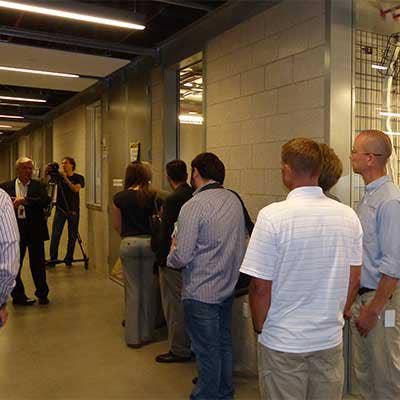
Clients Lining Up To Get a Look
OneNeck has begun marketing the Colorado data center to customers, Koch said, and is in talks with two prospective science clients.
The physical data centers have 320 cabinets, and customers can purchase space by the cabinet, row, cage, half data room or full data room, Koch said. Since cloud services are virtualized, customers can purchase as much or as little cloud capacity as they'd like without occupying any additional real estate.
Koch said OneNeck has seen significant interest in moving equipment off-site or services to the cloud.
"There continues to be high demand by CIOs for moving their data centers or IT operations to third parties," Koch said.
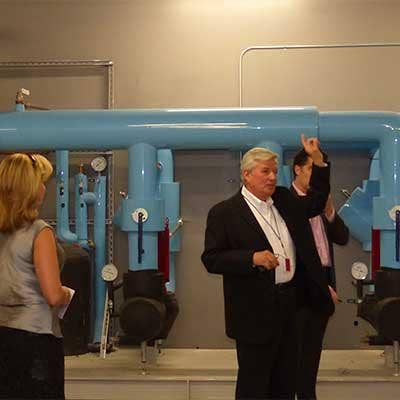
A Water And Moisture-Free Zone
One of the most intentional features of the Colorado data center was to keep water sources and HVAC (heating, ventilation and air conditioning) equipment completely out of the data rooms. The facility is one of the only data centers to employ gaseous fire suppression, according to Koch.
The data center roof is made of concrete and has a slight arch to provide additional load-bearing capacity.
Thanks to all these protections, the OneNeck data center meets the HIPAA, PCI, SSAE 16 (for service organizations) and ISO 27001 (information security standard) compliance requirements.
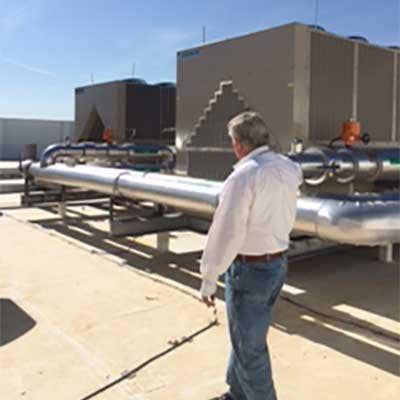
Getting Bigger And Better
OneNeck has constructed just one of what could eventually be five or 10 phases in its Colorado data center, Koch said. That is what happened at OneNeck's Madison, Wis., data center, which the company has expanded twice and now occupies roughly 105,000 square feet.
Expansion will be contingent, though, on the extent to which workloads migrate to the cloud.
If CIOs opt to continue owning their own equipment due to unique requirements in verticals such as health care, OneNeck will commence more quickly on additions, Koch said. But if the market moves rapidly to the cloud, physical space won't be at a premium and the need for additions will be limited.